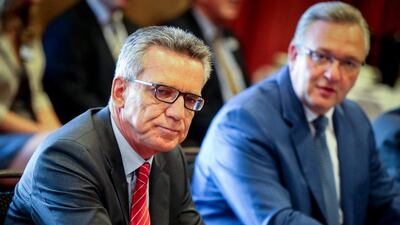BERLIN // Germany’s interior minister called for a partial ban on the full-face burqa veil, saying full face coverings “are not part of our open society.” Security officials also proposed a ban on wearing the burqa and other ace covering veils in public schools, courts and while driving, among other situations. “It is not a security issue but an integration issue,” he said, adding that a ban would be “likely to win approval” in parliament.
The call by Thomas de Maiziere came as the government of chancellor Angela Merkel attempted to address public fears surrounding last year’s record influx of migrants and refugees.
It also echoed a controversial move by several French coastal towns in recent weeks to outlaw “burkinis”, the full-body swimsuit, at a highly sensitive time for relations with the Muslim community following a series of attacks.
“We agree that we reject the burqa, we agree that we want to introduce a legal requirement to show one’s face in places where it is necessary for our society’s coexistence — at the wheel, at public offices, at the registry office, in schools and universities, in the civil service, in court,” Mr De Maiziere said after a meeting with regional counterparts from his Christian Democratic party.
He told public television that the full-face veil “does not belong in our cosmopolitan country”.
“We want to show our faces to each other and that is why we agree that we reject this. The question is how we put this into law,” he said. He acknowledged constitutional problems with a blanket burqa ban and said the proposal seeks only to prohibit face coverings “where showing the face has a function.”
He pointed out that Germany already bans wearing any kind of face covering at demonstrations, such as masks meant to hide protesters’ identities.
Mr De Maiziere did not say when he would put forward a draft bill but indicated that outlawing the burqa only under certain circumstances, as opposed to the blanket ban favoured by the hard right of Mrs Merkel’s Christian Union bloc, would be “likely to win approval” in parliament.
In an interview with a regional newspaper this week, Ms Merkel underlined her objections to the burqa.
“From my point of view, a woman who is entirely veiled has hardly any chance at integrating,” she said.
Mr De Maiziere’s position represented a compromise with hardliners ahead of two pivotal regional elections next month in which the right-wing populist Alternative for Germany (AfD) party looked set to make strong gains.
Last week he had rejected a call from conservative state interior ministers for a sweeping burqa ban and said: “We can’t ban everything that we reject, and I reject the wearing of the burqa.”
He made the comments on August 11 as he unveiled tough antiterrorism measures after two attacks in Germany last month claimed by ISIL.
The measures included a proposal to strip extremist fighters of their German nationality, as well as to speed up deportations of convicted criminal migrants and increase police resources.
Calls for a ban on burkas and other full-face veils emerged from parts of Ms Merkel’s bloc over the past two weeks amid discussions of how to step up security following several attacks last month — two of them claimed by ISIL which left Germany deeply shaken. However some within the chancellor’s own party regard the burqa ban as a distraction from more important issues.
France was the first European country to ban the full-veil in public spaces with a law “banning the hiding of the face in public spaces”. It was adopted on October 11, 201O and applied on April 11, 2011. The European Court of Human Rights in 2014 upheld the burqa ban, rejecting arguments that outlawing full-face veils breached religious freedom. The law has resulted in around 1,500 arrests in the past five years.
In Italy, a 1975 law aimed at protecting public order makes it illegal to cover one’s face in public places and the provision applies to the veil, as well as motorcycle helmets and other masks. The anti-immigrant Northern League has said this week it plans to present a draft law in September more specifically aimed at banning the burqa, niqab and the burking. However, the government has said it is not in favour of legislation on the issue on grounds of freedom of religion guaranteed under the Constitution.
There is no law in Britain restricting the wearing of garments for religious reasons. However in March 2007 the education ministry published directives allowing directors of public establishments and denominational schools to ban the niqab veil. Judges have on occasion refused to hear veiled women because they could not verify their identity.
* Agence France-Presse

